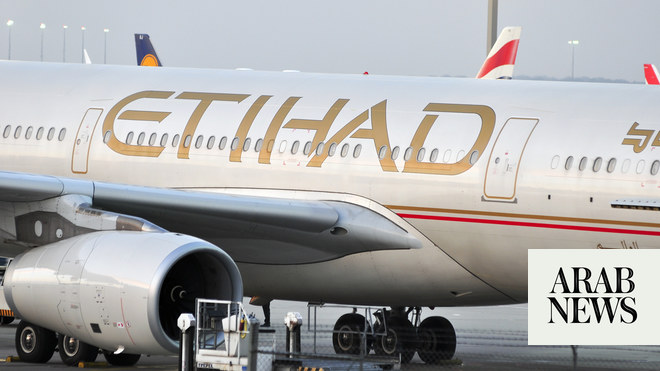
RIYADH: Etihad Airways made significant strides toward sustainability cutting its carbon emissions per revenue ton kilometer by 26 percent to 482 gram in 2022 from 2019 baseline, the company said in a new report.
The airline said its sustainability strategy underscores a strong commitment to environmental stewardship.
Among its initiatives, Etihad successfully operated its first net-zero flight using a book-and-claim for purchasing sustainable aviation fuel in partnership with World Energy, a carbon-net-zero solutions provider. The initiative resulted in offsetting 216 metric tons of carbon dioxide emissions.
“Our sustainability strategy is built on a foundation of collaboration, transparency, and innovation, and we will continue to work with our partners, industry peers, and government agencies to drive positive change and lead the way toward a greener future for aviation,” Antonoaldo Neves, CEO at Etihad Aviation Group, said.
Furthermore, the airline has already surpassed its reduction targets, which were set in November 2020, of achieving a gCO2/RTK of 574 in 2024.
Moreover, Etihad has ambitious plans for the future as it aims to achieve net-zero emissions by 2050. It is also exploring operating flights with sustainable aviation fuel made from CO2 in collaboration with Twelve, a US-based carbon transformation company.
“As we look to the future, we remain steadfast in our commitment to reducing our environmental impact and ensuring the sustainability of our operations,” Neves added.
In 2022, the airline launched a carbon offset program, allowing travelers to adopt a mangrove tree for each seat they purchase, contributing to removing carbon from the atmosphere. This initiative led to the planting of 68,916 mangrove trees in the Etihad Mangrove Forest project.
Etihad Airways also became the first foreign airline to obtain a supply of sustainable aviation fuel in Japan, working collaboratively with ITOCHU Corp. and Neste MY Sustainable Fuel.
This operation took place in the fourth quarter of 2022 and involved the first delivery of roughly 50,000 US gallons of fuel produced by Neste. The operation resulted in an estimated reduction of around 75 total CO2 emissions.












